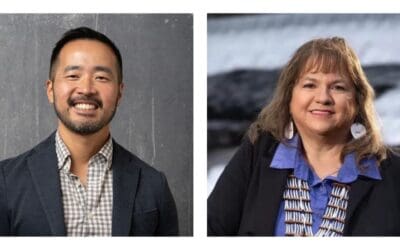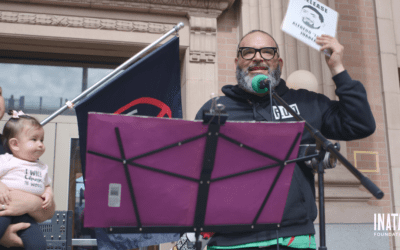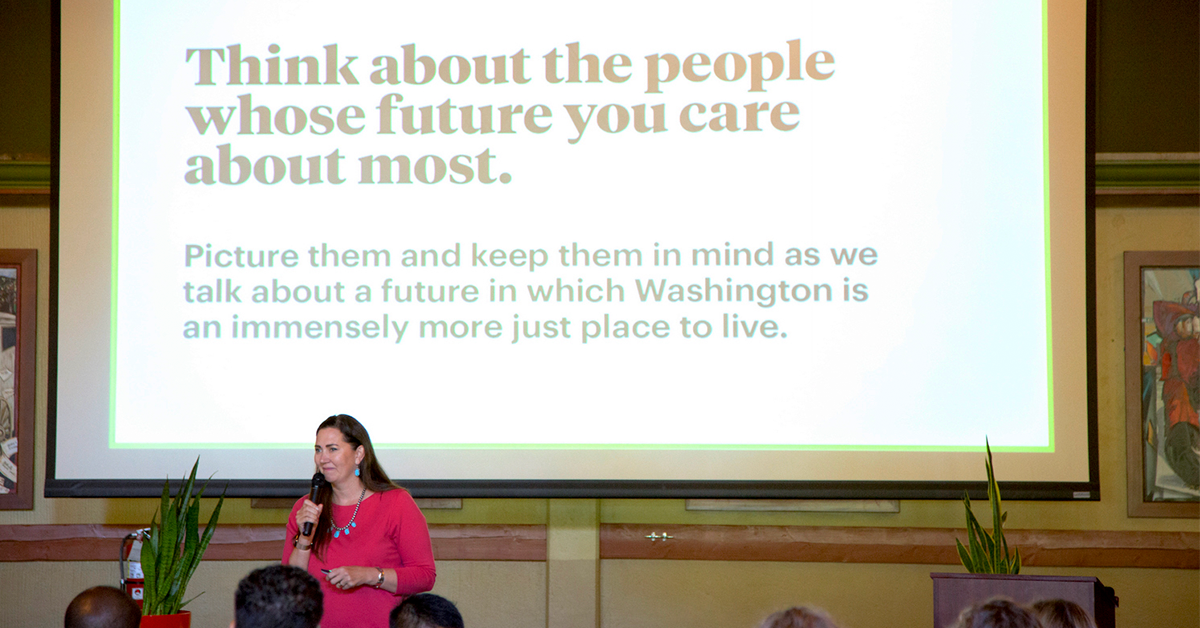
Photo: Nichole leads a discussion about our 50-Year Vision work at an all-team retreat in Bothell. Photo by John Lok.
Five years ago this fall, I showed up to my first day of work in my current role at a very different organization. It was an organization with five employees, a different name, and only the best intentions to expand and redefine what “health equity” means.
We were also an organization that was very clear about three things. We knew we needed to be truly statewide, center communities most impacted to change systems, and that we had an explicit and unapologetic commitment to racial justice and equity. Today we have grown to almost 60 team members, committed more than $250 million grants to incredibly diverse organizations touching every county in our state, updated our values and mission statement, and reintroduced ourselves with a new name. With all that change, and an incredible amount of learning, our determination and passion for those three core commitments have grown exponentially.
From the beginning, we were also charged with answering some big questions. For example, what is the potential impact of a large foundation focusing its work on a single state? What could we contribute as a foundation if we focused on building political power in the places and with the people who have been structurally organized out of opportunity? Where was the largest pot of 501(c)(4) money in the state, all dedicated to equity, needed most? How could we truly become a statewide organization?
The journey to answer those questions has been both a literal one—crisscrossing the state to meet community leaders—and a figurative one as we’ve expanded our understanding and thinking. While that journey continues, this five-year anniversary offers a chance to reflect on the truths it has consistently illuminated—truths that I hope may offer value for others in their work.
We live and breathe in a sea of dangerous assumptions about who our state really is. Thankfully, the reality is far more inspiring.
We are told that Washington is a white state. Not true. We are told there are no nonprofits outside of the I-5 corridor. Strategic myth. We are told there are not qualified people of color to hire or that whole communities don’t have the capacity or time to join boards and be involved in politics. Big lie. There’s a belief that half of our state lives in Seattle or that everyone who is important lives in King County. This is factually wrong.
The reality is that Washington is a wildly diverse state where 90 percent of people live beyond Seattle and 41 percent identify as people of color and/or immigrants, including 55 percent of young people and children. The reality is that, in every corner of the state, communities are advancing racial justice and equity in powerful ways. Likewise, in every single county, there are individuals and systems actively trying to limit and undermine the power of diverse leaders and their communities. Acknowledging this reality is a fundamental first step toward a just and equitable state where communities have the power and freedom to shape every part of how Washington works.
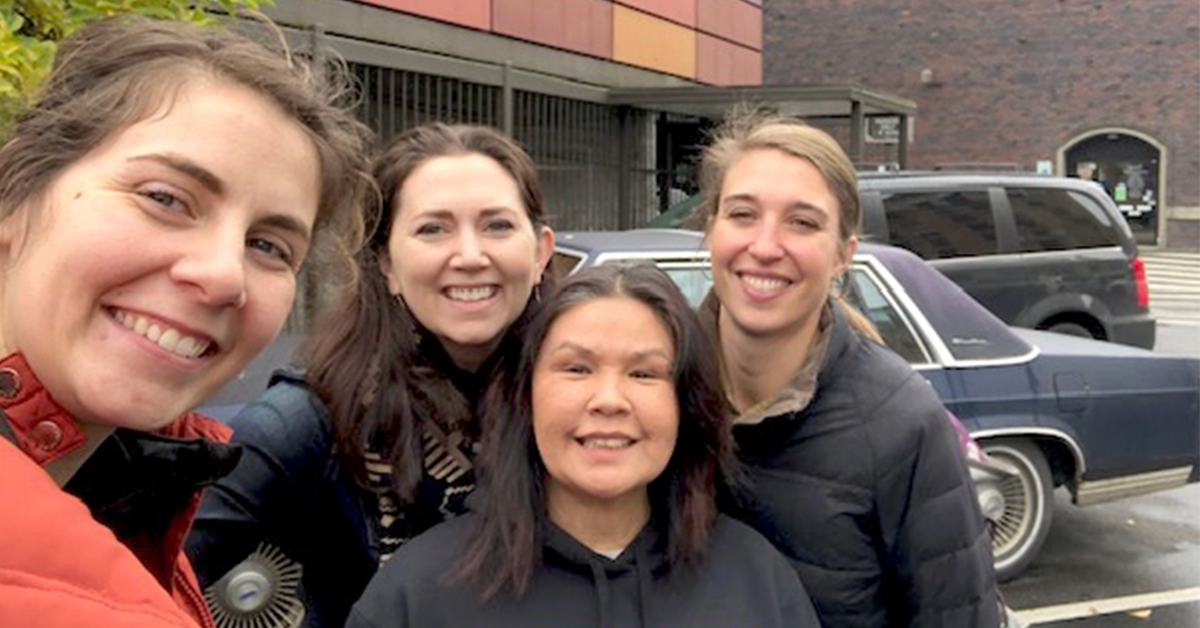
Photo: Nichole meeting with community leaders in Aberdeen.
There is no lack of powerful community leaders across Washington, only a lack of equitable funding.
Given this sea of dangerous myths, perhaps it’s no surprise that throughout our journey we’ve heard that there’s a lack of nonprofits to fund outside the I-5 corridor, that there aren’t enough qualified people of color to hire, and that underrepresentation on boards and in politics is because whole communities don’t have the time nor capacity to be engaged. Again, none of this is true.
The reality is that there are thousands of organizations in our state doing transformational work in their communities. It doesn’t look the same everywhere and they don’t always use the same words, but they are there doing it every day. Take Aberdeen, for example. So many times, I hear the same narrative: that there are no leaders who are doing work toward racial justice and equity in this community. The truth is, there are many excellent organizations with powerful women of color leaders with big and bold ambitions for what the future holds. And not only two or three organizations, but our team has met with more than a dozen across Grays Harbor County. It’s a similar story in the Tri-Cities, which is a flourishing ecosystem of leadership fueled by its majority Latine population, rich history of Black leadership, multiple Tribes with significant land and cultural connection, and a thriving Asian community.
These are historic and powerful communities, not recent or emerging. Their amazing work is happening even though a disproportionate amount of philanthropic funding is focused on just a sliver of the state. Imagine the possibilities if we centered and deeply invested in the vision of these communities in the way they have always deserved. The joy and clarity of what is possible in these places and for our entire state is so profound when we see and believe in their leadership and vision.
Real expertise runs deep in Washington, but we must be willing to follow it.
Inatai prides itself on being a truly statewide organization. Statewide to us means not only recruiting a team and board from across Washington, but also who we elevate as experts in the work for equity and justice: community leaders. Our work is grounded in their truth, their visions, and their solutions. That’s why we were and are deliberate about bucking a habit so prevalent in our field: relying consultants to do the important work of relationship-building, listening, and applying those lessons to strategy. Instead, our statewide team has built direct relationships with local leaders. Our goal isn’t to be an expert in every community. Rather, it’s to know the experts in every community.
Ultimately, that’s who we are accountable to. As with any relationship, it requires honest communication, active listening, and ongoing collaboration to ensure we can be the best supporters we can be. But let’s be clear, this listening, learning, and relationship building doesn’t happen occasionally to inform our work. It is the work. Because of that, it will be a constant in our approach.
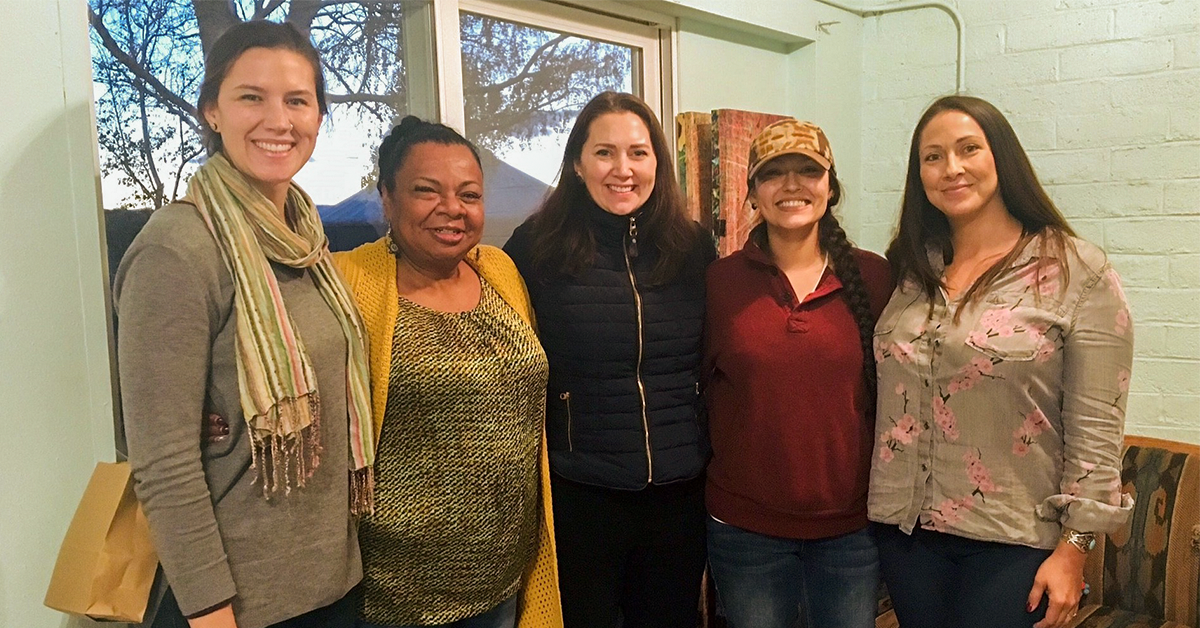
Photo: Nichole, along with Inatai’s Community Engagement Manager Rosa Gimson (left), meets with Carmanita Pimms, Semone Dittenholer, and Shannon Magee of the Ttáwaxt Birth Justice Center in Wapato.
There is resistance to the truths right in front of us.
None of what I’ve shared here is a secret, nor will it be a surprise to organizations and leaders doing equity and racial justice work. And yet these myths about leadership and expertise persist for a reason. In the halls of power and decision making in our great state, equity and racial justice are still too often seen as an intrusive burden rather than a winning formula. For too many, it’s easier to subscribe to the myths and maintain the status quo than to acknowledge the truth and push for real transformation. We can’t allow this.
Thankfully, the fight for truth doesn’t have to be long or hard. The excuses and rationalizations have many layers, but the solution is simple. You must believe that leaders exist, believe that the people are capable, and believe that the future we all want and are fighting for is dependent on the leaders we already have in our state. Every step of Inatai’s journey these last five years has proven this.
When you follow these leaders, you unlock a vision of Washington that’s nothing short of inspiring. As we’ve heard from them directly, it’s a state where their land is sacred, rights are real, and communities are connected. It’s a Washington that celebrates its diversity, invests in its communities equitably, and is governed by leaders who truly represent those communities. In short, it’s a Washington we should all aspire to.
It’s been an incredible honor working alongside so many incredible leaders across our state as President and CEO of this foundation over the last five years. I am looking forward to the next five years of service, and the invaluable lessons I will continue to learn along the way.
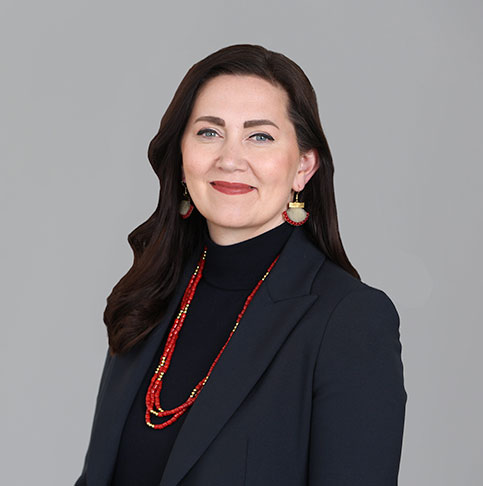

Nichole June Maher
President & CEO

